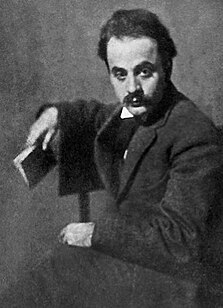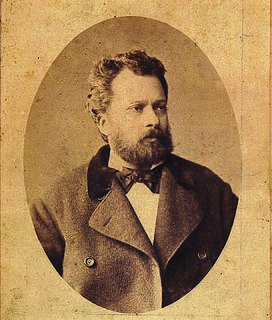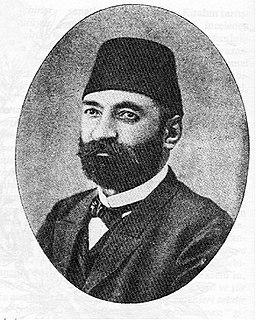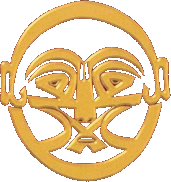 W
WAkshamsaddin, was an influential Ottoman religious scholar, poet, and mystic saint. He was an influential tutor and adviser to Sultan Mehmed the Conqueror. After completing his work with his master Shaykh Haji Bayram Wali, he founded the Shamsiyya-Bayramiyya Sufi order. He discovered the lost grave of Abu Ayyub al-Ansari in Constantinople preceding the Siege of Constantinople.
 W
WBâḳî (باقى) was the pen name of the Ottoman Turkish poet Mahmud Abdülbâkî. Considered one of the greatest contributors to Turkish literature and Azerbaijani literature. Bâkî came to be known as Sultânüş-şuarâ, or "Sultan of poets".
 W
WYahya Kemal Beyatlı, born Ahmet Âgâh, was a leading Turkish poet and author, as well as a politician and diplomat.
 W
WRıza Tevfik Bey was an Ottoman and later Turkish philosopher, poet, politician of liberal signature and a community leader of the late-19th-century and early-20th-century. A polyglot, he is most remembered in Turkey for being one of the four Ottoman signatories of the disastrous Treaty of Sèvres, for which reason he was included in 1923 among the 150 personae non gratae of Turkey, and he spent 20 years in exile until he was given amnesty by Turkey in 1943.
 W
WSuzi Çelebi of Prizren, in Turkish Prizrenli Suzi Çelebi, was an Ottoman poet and historiographer. He is remembered for his epic poem Gazavatnam Mihaloğlu which narrates the 15th-century Balkan conquests of the Ottomans, and the battles and glory of the military commander Ali Bey Mihaloğlu, being one of the most-known poetic works of the 15th century in overall.
 W
WDadaloğlu (Veli) (1785 ?–1868 ?) was a Turkish Ottoman bard, a folk poet.
 W
WYahya bey Dukagjini was an Ottoman poet and military figure. He is one of the best-known diwan poets of the 16th century. He wrote in Ottoman Turkish.
 W
WTevfik Fikret was the pseudonym of Mehmed Tevfik, an Ottoman educator and poet, who is considered the founder of the modern school of Turkish poetry.
 W
WMahammad bin Suleyman, better known by his pen name Fuzuli, was an Azerbaijani, of the Bayat tribes of Oghuz, poet, writer and thinker. Often considered one of the greatest contributors to the divan tradition of Azerbaijani literature, Fuzuli in fact wrote his collected poems (divan) in three different languages: in his native Azerbaijani, Arabic and Persian. He was well-versed in both the Ottoman and Chagatai Turkic literary traditions as well as mathematics and astronomy.
 W
WGibran Khalil Gibran, usually referred to in English as Kahlil Gibran, was a Lebanese-American writer, poet and visual artist, also considered a philosopher although he himself rejected the title. He is best known as the author of The Prophet, which was first published in the United States in 1923 and has since become one of the best-selling books of all time, having been translated into more than 100 languages. Born in a village of the Ottoman-ruled Mount Lebanon Mutasarrifate to a Maronite family, the young Gibran immigrated with his mother and siblings to the United States in 1895. As his mother worked as a seamstress, he was enrolled at a school in Boston, where his creative abilities were quickly noticed by a teacher who presented him to photographer and publisher F. Holland Day. Gibran was sent back to his native land by his family at the age of fifteen to enroll at the Collège de la Sagesse in Beirut. Returning to Boston upon his youngest sister's death in 1902, he lost his older half-brother and his mother the following year, seemingly relying afterwards on his remaining sister's income from her work at a dressmaker's shop for some time.
 W
WGül Baba, also known as Jafer, was an Ottoman Bektashi dervish poet and companion of Sultan Suleiman the Magnificent who took part in a number of campaigns in Europe from the reign of Mehmed II onwards.
 W
WNamık Kemal was an Ottoman democrat, writer, intellectual, reformer, journalist, playwright, and political activist who was influential in the formation of the Young Ottomans and their struggle for governmental reform in the Ottoman Empire during the late Tanzimat period, which would lead to the First Constitutional Era in the Empire in 1876. Kemal was particularly significant for championing the notions of freedom and fatherland in his numerous plays and poems, and his works would have a powerful impact on the establishment of and future reform movements in Turkey, as well as other former Ottoman lands. He is often regarded as being instrumental in redefining Western concepts like natural rights and constitutional government.
 W
WMohammed Saeed Al-Habboubi was an Iraqi Poet, Faqīh, and a merchant, born in Najaf to a wealthy family.
 W
WMuallim Naci, literally "Naci The Teacher", was an Ottoman writer, poet, educator and literary critic.
 W
WAlī Imādud-Dīn Nasīmī, often known as Nesimi, was a 14th-century Azerbaijani or Turkmen Ḥurūfī poet. Known mostly by his pen name of Nesîmî, he composed one divan in Azerbaijani, one in Persian, and a number of poems in Arabic. He is considered one of the greatest Turkic mystical poets of the late 14th and early 15th centuries and one of the most prominent early divan masters in Turkic literary history.
 W
WSüleyman Nazif was a Turkish poet and a prominent member of the CUP. He mastered Arabic, Persian, and French languages and worked as a civil servant during the reign of Sultan Abdul Hamid II. He contributed to the literary magazine Servet-i Fünun until it was censored by the Ottoman government in 1901.
 W
WKul Nesîmî, or simply Nesîmî, real name Ali was an Ottoman Alevi-Bektashi poet, who lived in the 17th century in Anatolia.
 W
WOsman II, commonly known in Turkey as Genç Osman, was the Sultan of the Ottoman Empire from 1618 until his regicide on 20 May 1622.